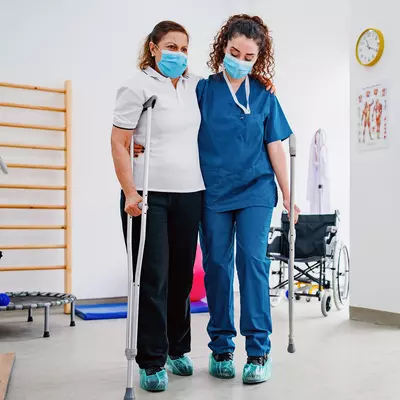- AdventHealth

Choose the health content that’s right for you, and get it delivered right in your inbox.
Most people with COVID-19 fully recover in two to six weeks. But the longer the disease exists, the more doctors realize that some cases linger. In a recent study of more than 1,600 people hospitalized with COVID-19, 76% still had at least one symptom six months afterward.
Patients themselves have named this “long COVID.” Surprisingly, symptoms can persist — or even worsen — over time. Even young people, those who had a relatively mild case, and individuals with no previous underlying health conditions have reported lasting problems.
Impacts to Different Areas of the Body
Medical researchers and scientists call this condition post-acute sequelae of SARS-CoV-2 infection, or PASC. Sequela (or plural, sequelae) is a condition that stems from a previous illness — in this case, the initial COVID-19 infection — and SARS-CoV-2 is the scientific name of the virus that causes COVID-19.
Common complaints of so-called “long haulers” include fatigue, chest or joint pain and cough with symptoms lasting for 28 days or more. COVID-19 can also harm:
- The lungs. The virus—or inflammation, the body’s reaction to it—can scar the lungs and weaken muscles involved in breathing. The resulting shortness of breath often makes daily activities difficult. And in severe cases, it can cause respiratory failure.
- The heart. Inflammation can also harm your cardiovascular system. After infection, some people develop myocarditis, a condition that changes your cardiac muscle cells. This makes it harder for your heart to pump blood. Patients have also experienced palpitations, arrhythmias and blood clots.
- The brain. In addition to the nerves, COVID-19 may affect brain tissue directly . This leads to memory and concentration problems, sometimes called “brain fog.”
- Mental health. Any long-term illness can lead to low mood. In those diagnosed with COVID-19, the need for physical distancing likely exacerbates those feelings. They may experience anxiety, depression, mood changes and trouble sleeping. They also appear prone to post-traumatic stress and substance use disorders.
Keeping the Community Safe
The reason why some people are experiencing lingering symptoms while others don’t is still greatly unknown. We don’t yet know the full long-term effects of coronavirus, including the impact on organs, and there isn’t enough data available yet to know why some bodies react differently than others to the same virus.
Our experts say that in some instances of long-hauler cases, symptoms have improved and/or resolved after the patient receives their COVID-19 vaccine.
In addition to getting the COVID-19 vaccine , basic steps like social distancing and wearing a mask are the best ways to protect yourself and everyone around you, whether you’re a long-hauler or not. Continue to practice the safety steps you already know, like:
- Avoiding touching your eyes, nose and mouth
- Cleaning and disinfecting frequently touched surfaces daily
- Getting your annual flu shot
- Social distancing from others in public
- Washing your hands often with soap and water or using sanitizer often
- Wearing a mask that covers your mouth and nose when around others
As we navigate waves of coronavirus cases and work towards vaccinating eligible members of our community, we’ll guide you as you balance being safe with moving forward. Get the latest information by visiting the AdventHealth Coronavirus Resource Hub .



